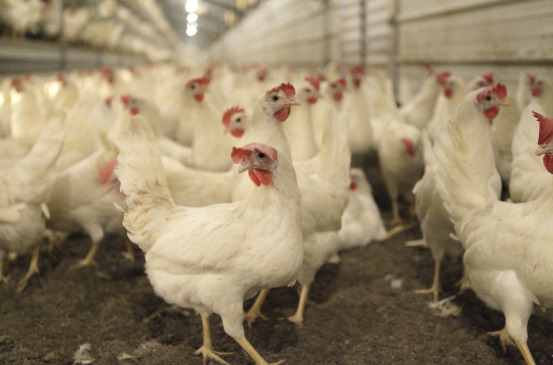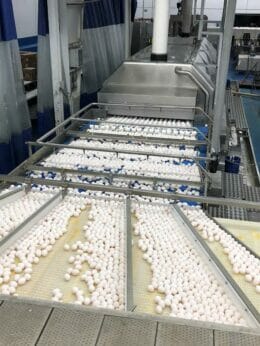A New Egg Co-operative Has Hatched in the Western U.S.
ProEgg members are hopeful their model can plug up holes in the supply chain contributing to egg scarcity and sticker shock.
A New Egg Co-operative Has Hatched in the Western U.S.
ProEgg members are hopeful their model can plug up holes in the supply chain contributing to egg scarcity and sticker shock.

Currently, 24 million hens are part of the ProEgg co-op.courtesy of ProEgg
It doesn’t always pay to be an egg farmer—just ask Cliff Lillywhite.
The owner and president of Oakdell Egg Farms, in North Salt Lake, UT, says he’s never experienced a year more difficult or more disruptive than the one that’s just passed.
“Our farms were not spared from bird flu,” says Lillywhite, referencing two separate incidents that required him to cull nearly half of his flock, more than one million chickens.
There is the emotional impact of culling an inflected flock and there’s the financial impact, too, he explains, having lost several thousand dollars. But what also weighs heavily, says Lillywhite, is knowing that his business was partly responsible for egg scarcity and bare shelves in the communities they serve.
“My wife’s family started this business in 1905, and the family has always felt an obligation to our loyal customers,” he says. “I thought ‘we can’t keep going like this if we want to stick around. Something has to change.’”
He’s hoping a new co-operative, ProEgg, will remedy his farming woes. Together, eight farms in the western U.S. are raising a collective 24 million hens, and Lillywhite he says everyone has the same reason for teaming up: They can’t navigate today’s challenges in agriculture on their own.
“There’s strength in numbers,” says Lillywhite. “We’re going to be able to help each other out and stay nimble with production to ensure our customers can continue to rely on us.”
The goal for ProEgg is that, by having a wide pool of producers, there’s access to supply that could fill any gaps in orders. In the case of an avian flu outbreak or any other situation, one member of the co-op could take over fulfilling orders from another member, instead of letting production screech to a halt.

Ric Herrera, ProEgg’s CEO, will be overseeing sales and customer relations for the farmers. He anticipates that, by reducing supply shortages, consumers will also see a price reduction.
“I see this model being key to the sustainability of egg producers in this country,” he says. “There are a lot of smaller producers that don’t have the scale of operations to cope with a hit to their production, and a lot of them are facing a decision to leave the industry. It’s a scary, scary thought.”
Lillywhite says his motivation for joining the co-op is that he’s particularly worried about future bird flu outbreaks.
Since the outbreak was detected in February 2022, it’s been deemed the deadliest year for outbreaks in U.S. history. More than 57 million birds in hundreds of commercial and backyard flocks have been affected by it—according to the U.S. Department of Agriculture data. The depopulations at commercial facilities have decreased the domestic egg supply by about 7.5 percent on average each month since the outbreak began. And, although the United Egg Producers has projected “a lull in detections” over the next few months, there is anticipation that cases will pick back up again as the bird migration season renews.
Farmers with flocks that become infected must complete a carcass disposal, followed by thorough cleaning, disinfecting and a 28-day downtime period where they are unable to start raising flocks. The state also has to complete surveillance testing on birds before they’re cleared to enter commercial markets. The entire process can push producers back by 10 to 15 weeks. But it takes on average four to five months, says Lillywhite, for a producer to bounce back to peak productivity.
Combined with inflationary issues such as the high cost of feed, fuel and packaging, an outbreak can really take a bite out of profits. It’s also one of the reasons U.S. supermarket shelves are often bare or sell product at a markedly higher rate.
The U.S. Bureau of Labor Statistics says egg prices in December rose 60 percent from a year earlier.
Some stores such as Kroger, Whole Foods and Lidl have put limits on how many cartons of eggs buyers can purchase at once, simply because supply is stretched so thin. “We’re hoping to avoid that,” says Lillywhite. “It will be a successful year for me if I see no empty shelves in the regions I serve.”
Right now, the co-op’s eggs will be sold in Alaska, Arizona, California, Colorado, Hawaii, Idaho, Montana, Nevada, New Mexico, Oregon, Utah, Washington and Wyoming, but Herrera says there’s a plan to not only expand eastward but generally to add more members.
ProEgg’s head office will be based in Aurora, CO, where Herrera will be working with a team concentrating on expanding its reach. “We want the farmers to only have to focus on and worry about one thing: producing eggs,” he says. “That’s what they’re good at.”
The co-op is in the process of finalizing its details and building out a plan, but it is scheduled to take over sales in the spring. Members will offer up a percentage of their profits to Herrera and his team. Although that percentage or fee has not yet been established, Lillywhite says he suspects it will be a “moving target” adjusted to market conditions.
In order to keep Oakdell Farms alive, the business has to adapt to change—and band together with its neighbors.
Follow us
This work is licensed under a Creative Commons Attribution-NoDerivatives 4.0 International License.
Want to republish a Modern Farmer story?
We are happy for Modern Farmer stories to be shared, and encourage you to republish our articles for your audience. When doing so, we ask that you follow these guidelines:
Please credit us and our writers
For the author byline, please use “Author Name, Modern Farmer.” At the top of our stories, if on the web, please include this text and link: “This story was originally published by Modern Farmer.”
Please make sure to include a link back to either our home page or the article URL.
At the bottom of the story, please include the following text:
“Modern Farmer is a nonprofit initiative dedicated to raising awareness and catalyzing action at the intersection of food, agriculture, and society. Read more at <link>Modern Farmer</link>.”
Use our widget
We’d like to be able to track our stories, so we ask that if you republish our content, you do so using our widget (located on the left hand side of the article). The HTML code has a built-in tracker that tells us the data and domain where the story was published, as well as view counts.
Check the image requirements
It’s your responsibility to confirm you're licensed to republish images in our articles. Some images, such as those from commercial providers, don't allow their images to be republished without permission or payment. Copyright terms are generally listed in the image caption and attribution. You are welcome to omit our images or substitute with your own. Charts and interactive graphics follow the same rules.
Don’t change too much. Or, ask us first.
Articles must be republished in their entirety. It’s okay to change references to time (“today” to “yesterday”) or location (“Iowa City, IA” to “here”). But please keep everything else the same.
If you feel strongly that a more material edit needs to be made, get in touch with us at [email protected]. We’re happy to discuss it with the original author, but we must have prior approval for changes before publication.
Special cases
Extracts. You may run the first few lines or paragraphs of the article and then say: “Read the full article at Modern Farmer” with a link back to the original article.
Quotes. You may quote authors provided you include a link back to the article URL.
Translations. These require writer approval. To inquire about translation of a Modern Farmer article, contact us at [email protected]
Signed consent / copyright release forms. These are not required, provided you are following these guidelines.
Print. Articles can be republished in print under these same rules, with the exception that you do not need to include the links.
Tag us
When sharing the story on social media, please tag us using the following: - Twitter (@ModFarm) - Facebook (@ModernFarmerMedia) - Instagram (@modfarm)
Use our content respectfully
Modern Farmer is a nonprofit and as such we share our content for free and in good faith in order to reach new audiences. Respectfully,
No selling ads against our stories. It’s okay to put our stories on pages with ads.
Don’t republish our material wholesale, or automatically; you need to select stories to be republished individually.
You have no rights to sell, license, syndicate, or otherwise represent yourself as the authorized owner of our material to any third parties. This means that you cannot actively publish or submit our work for syndication to third party platforms or apps like Apple News or Google News. We understand that publishers cannot fully control when certain third parties automatically summarize or crawl content from publishers’ own sites.
Keep in touch
We want to hear from you if you love Modern Farmer content, have a collaboration idea, or anything else to share. As a nonprofit outlet, we work in service of our community and are always open to comments, feedback, and ideas. Contact us at [email protected].by Lindsay Campbell, Modern Farmer
January 17, 2023
Modern Farmer Weekly
Solutions Hub
Innovations, ideas and inspiration. Actionable solutions for a resilient food system.
ExploreExplore other topics
Share With Us
We want to hear from Modern Farmer readers who have thoughtful commentary, actionable solutions, or helpful ideas to share.
SubmitNecessary cookies are absolutely essential for the website to function properly. This category only includes cookies that ensures basic functionalities and security features of the website. These cookies do not store any personal information.
Any cookies that may not be particularly necessary for the website to function and are used specifically to collect user personal data via analytics, ads, other embedded contents are termed as non-necessary cookies.
Sounds real good to me. Paid over $7/dozen for jumbo eggs last week. Most ever paid for eggs in my entire life.
Whenever farmers band together, they all benefit.…
Former General Manager of the Canadian Egg Marketing Agency.